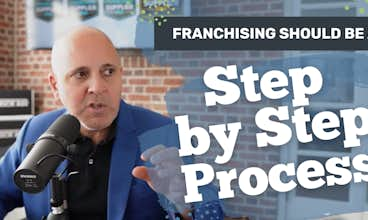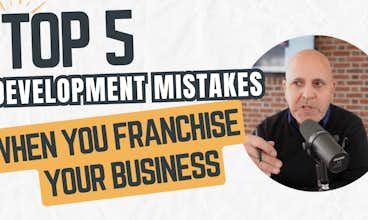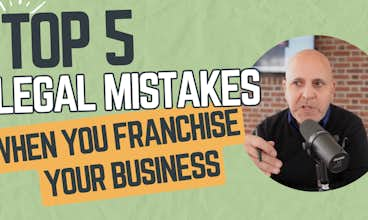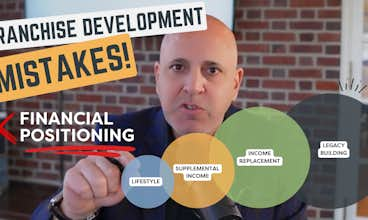What You Need to Know About Investors When Franchising a Business
When working with clients to establish and launch their franchise system‚ the issue of existing and potential future “investors” frequently comes up. That is‚ I am either advised that my client already has investors who purchased stock in his or her existing company or that he or she would like to sell a minority interest of stock in the franchise company that we are about to form. I certainly understand that certain clients may wish to raise additional capital to cover expenses and investments associated with establishing a franchise system. However‚ to raise capital and sell stock in your business‚ you must be aware that‚ in most instances‚ your stock sale (even though you may be a small start-up franchisor with a few investors comprised of family and friends) will subject you to various federal and state securities laws and regulations. Consider that‚ many times‚ the sale of stock in your franchise company will require that you issue and disclose information contained in a prospectus / disclosure document to be delivered to your prospective investors. A securities prospectus is similar to a Franchise Disclosure Document in that the prospectus is designed to contain specified information to inform prospective investors about the business they may invest in and the risks associated with such investment.
Although I am a franchise lawyer and not a securities lawyer‚ the issue of stock sales comes up often and‚ as such‚ it is important that you be aware of the following general points / overview:
- Even though your franchise company will be a small closely-held company / entity‚ the sale of stock / equity will be deemed the sale of a security under Federal and State Law.
- Two of the many issues to be concerned with when selling stock / equity in your franchise company‚ consist of: (1) registration of the securities offering with a regulatory agency; and (2) providing investors with a prospectus (a disclosure document similar to an FDD).
- Section 4(2) of the Securities Act of 1933 (the “Securities Act”) provides certain exemptions from “registration” respecting “private stock offerings” that do not involve “general solicitations” or “marketing” respecting the sale of equity. In particular‚ for certain private stock offering‚ Rule 506 provides the primary factors / “safe harbor” that must be satisfied to qualify for the Section 4(2) private offering exemption.
- The Rule 506 safe harbor exemption identifies and is limited to two classes of investors comprised of (a) an “Accredited Investor” (typically institutions and high net worth individuals‚ i.e.‚ individuals with annual income of $200K in each of the two most recent years)‚ and (b) a “Sophisticated Investor”(a sophisticated investor being an individual that must have sufficient knowledge and experience in financial and business matters to make them capable of evaluating the merits and risks of the prospective investment). Stock / equity cannot be sold to anyone other than an Accredited Investor or Sophisticated Investor and qualifications must be carefully evaluated to ensure that the investor is sophisticated.
Accredited Investors vs. Non-Accredited Investors
When selling to an “accredited investor” (assuming other criteria are met) there are no mandated disclosure obligations. However‚ when selling to “sophisticated investors” there are disclosure obligations. Under this exemption / safe harbor‚ registration of your equity offering is not required. Assuming that the potential investors are not “accredited investors” but qualify as “sophisticated investors”‚ the following criteria must be established under safe harbor Rule 506:
- You can raise an unlimited amount of capital;
- You cannot use general solicitation or advertising to market the securities;
- You can sell securities to an unlimited number of accredited investors (the same group we identified in the Rule 505 discussion) and up to 35 other purchasers. All non-accredited investors (i.e.‚ Sophisticated Investors)‚ either alone or with a purchaser representative‚ must be sophisticated - that is‚ they must have sufficient knowledge and experience in financial and business matters to make them capable of evaluating the merits and risks of the prospective investment;
- It is up to you to decide what information you give to accredited investors‚ so long as it does not violate the anti-fraud prohibitions.
- You must give non-accredited investors (i.e.‚ Sophisticated Investors) disclosure documents that generally are the same as those used in registered offerings. If you provide information to accredited investors‚ you must make this information available to the non-accredited investors as well;
- You must be available to answer questions by prospective purchasers;
- Financial statement requirements: investors must first be provided with audited financial statements. However‚ if audited financial statements without unreasonable effort or expense may not be obtained then you may limit the financial statements to the company's audited balance sheet‚ to be dated within 120 days of the start of the offering.
Always Play it Safe - Speak to Your Franchise Attorney First
“Franchising your business” is all about building a system that will grow and develop over time. Part of that growth will require a stable shareholder base and at the initial franchise inception stage it is critical that you comply with applicable securities laws before you sell any stock in your company. Otherwise‚ you will be subjecting yourself to unnecessary future exposure and instability that may be caused by minority shareholders. Before you sell stock‚ speak to your attorney and establish a clear plan – including a stock offering prospectus‚ if necessary – to ensure that you sell stock properly.








